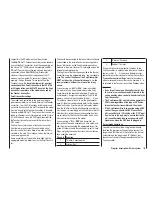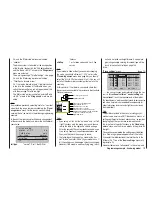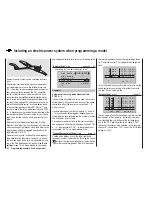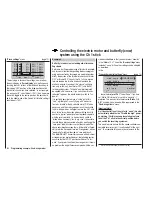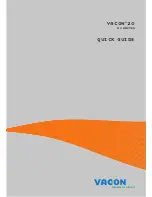
148
Programming example - fi xed-wing model
it is the refi nements which will give you more long-term
pleasure in your fl ying. Assuming that you are already
capable of controlling your model safely, it’s time to get
a taste of these extra facilities; to this end we now move
on to the …
“Fixed-wing mixers”
menu
(pages 88 … 93)
0%
0%
0%
0%
0%
0%
0%
0%
0%
0%
0%
0%
–––
–––
–––
–––
–––
–––
–––
–––
–––
–––
–––
a i l
a i l
d i f f a i l e .
rudd
flaps
brak
brak
brak
elev
flap
aile
elev
elev
flap
flap
aile
elev
flap
d i f f – r e d
aile
d i f f f l a p s
Note:
This menu will show a varying range of options depend-
ing on the information you have entered in the “
Basic
settings
” menu. In the illustration above, the full range
is shown, as generated by the entries “2AIL 2FL” in the
“Ail/Flap” line, and “none (/inv) in the “Motor at Ch 1” line.
Of particular interest at the moment are “
AIL-Diff.
”
(aileron differential) and the “
AIL
¼
RUD
” (aileron
¼
rudder) mixer, sometimes known as a combi-switch,
and perhaps the mixers “
Brake
¼
AIL
” and “
Brake
¼
FLAP
”.
As already described in detail on pages 89 and 90, the
purpose of “
AIL-Diff.
” (aileron differential) is to eliminate
adverse yaw.
When a model aircraft turns, the down-going aileron
produces more drag than the up-going one if both move
through the same angle, and this causes the model to
yaw in the opposite direction to the turn. This can be
eliminated by setting differential aileron travel. A value
between 20% and 40% is usually a good starting point,
but the “perfect” setting nearly always has to be estab-
lished by practical testing.
The same applies to the “
FL-Diff.
” (fl ap differential)
option if your model also features two camber-changing
fl ap servos, assuming that the fl aps are also to be used
as ailerons, e. g. using the “
AIL
¼
FL
” mixer.
The “
AIL
¼
RUD
” (aileron
¼
rudder) mixer serves a
similar purpose, but also makes many models generally
easier to handle when turning. A value of around 50%
is usually a practical starting point. However, it is advis-
able to be able to switch this function off, particularly if
you have ambitions as an aerobatic pilot; this is done by
assigning a physical switch to the mixer (for example,
the writer switches this mixer off “automatically” when he
switches into the “Speed” fl ight phase, simply by assign-
ing the same switch to both options).
It is usually only necessary to set up a “
Brake
¼
ELE
”
(brake
¼
elevator) mixer if your model suffers an
excessive change of speed when you deploy the brak-
ing system. The danger is that you might need to retract
the brakes again on the landing approach when you
realise the model will “land short”; if its airspeed is too
low when you retract the brakes, the model will just fall
to the ground at that point. If you set up such a mixer it is
important to test the setting at a safe height, and adjust
the trim compensation if necessary.
If you have selected “2AIL” or “2AIL 2FL” in the “Aileron /
Flap” line of the “
Basic settings
” menu …
stick mode
motor at C1
1
no
tail type
nor mal
CH8 delay
aile/flap
2aile
yes
… and if you wish to be able to defl ect both ailerons up
using the throttle / brake stick (Ch 1), then a suitable
value should be entered in the “
Brake
¼
AIL
” line.
0%
0%
0%
0%
–––
–––
–––
–––
–––
0%
a i l
d i f f a i l e .
rudd
brak
brak
elev
aile
elev
aile
In principle the same applies to the “
Brake
¼
FL
” line,
which also becomes available if you have selected “2AIL
2FL”, although the set value should cause the fl aps to
defl ect as far as possible in the downward direction
when the brake stick is operated. It is important to en-
sure that the servos do not strike their mechanical end-
stops. To achieve this, you may need to limit the servo
travel(s) for the servos concerned using the “TRAVEL-”
or “” line on the “RX SERVO” display page of
the “
Telemetry
” menu.
If the ailerons are set up to act as simple brakes, as de-
scribed previously, or as part of the braking arrangement
in a butterfl y (crow) system, then you should
always
enter a value for “
Diff.-Red.
” (“differential reduction” -
see page 93) - selecting 100% is the safe option here!
Differential reduction means that aileron differential is
suppressed proportionally
only
when you operate the
Содержание mx-16 HOTT
Страница 1: ...Programming Manual 33116 mx 16 HoTT 2 gb H O P P I N G T E L E M E T R Y T R A N S M I S S I O N mx 16...
Страница 7: ...7 For your notes...
Страница 37: ...37 For your notes...
Страница 41: ...41 For your notes...
Страница 45: ...45 For your notes...
Страница 51: ...51 For your notes...
Страница 55: ...55 For your notes...
Страница 81: ...81 For your notes...
Страница 103: ...103 For your notes...
Страница 133: ...133 For your notes...
Страница 141: ...141 For your notes...
Страница 161: ...161 For your notes...
Страница 173: ...173 For your notes...


